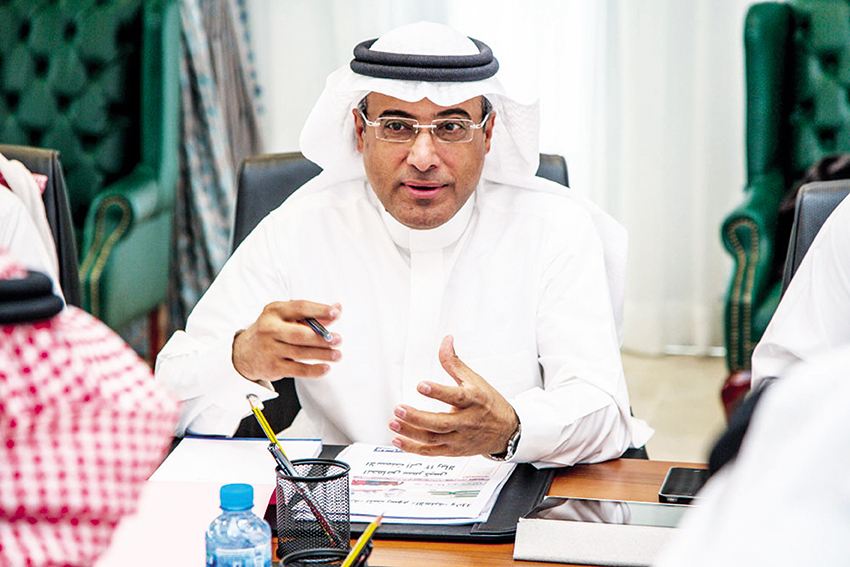Cement sector sales in 2015 are expected to witness a visible rise on the back of improved demand, backed by heavy infrastructure development

Fuelled by its massive oil reserves, Saudi Arabia’s construction boom continues to accelerate. Government spending at all levels of infrastructure is high, keeping on par with a rising population that demands more housing, more schools, more hospitals and more roads.
Mega projects are the norm, with huge transport networks under development along with six new economic cities.
Indeed crucial to all of these projects is cement. Saudi cement sales are expected to increase substantially in 2015, despite short-term problems such as labour shortages and uncertainty over the availability of subsidised fuel for capacity expansion.
Cement is an investor’s market at this point in the game, with healthy returns on the horizon.
Cement consumption growth has been steady during the past few years. The residential building sector, which makes up 60 per cent of the market, is expected to grow in the long term at a rate of 10 per cent.
A rising population, a new focus on nuclear families and new mortgage laws have all contributed to this.
However, fuel allocation has proved a bottleneck in the industry. In the past, expansion plans have been delayed due to disputes over fuel supply with the government, as was the case in 2011 with Yanbu Cement (the leading cement company in the Western region).
There are also supply concerns. Over the past few years, clinker inventory levels have declined substantially.
However, the government has adopted a number of measures to mitigate this threat. These include government mandated minimum inventory levels, obligatory cement imports when needed, and government support for additional cement companies.
Due to the rise in demand, cement prices are regulated if necessary.
Export bans have also been instituted. In 2012, the price ceiling was set at SAR240 ($64) per ton.
The customary high profits stem much in part from cheaper raw materials and fuel, which account respectively for 32 per cent and 29 per cent of production expenditure.
With average net margins of 45.9 per cent, the kingdom’s cement companies enjoy on average better profitability than their regional and global competitors.
While supply shortage risks exist, many expect that cement production capacity will be able to cope with construction demands. In 2015, Saudi Arabia has 60 million tons of production capacity, with an estimate of over 70 million tons for 2017.
This number nearly doubles the production capacity of Qatar and UAE combined.
Yanbu Cement is the largest cement company in the western region, which is the largest cement market in the kingdom, being comprised of four major cities: Jeddah, Mecca, Medina, and Ta’if.
The company is the third largest at a national level out of a group of 15 players in terms of production, sales, and revenue, having a current market capitalisation of almost $3 billion.
These numbers are the result of a strategy of efficiency, becoming more eco-friendly, and a sustainable commitment to ‘Saudisation’.
The former being done in the form of training, both at their own training centre and also in partnership with companies abroad.
Recently Yanbu Cement signed an agreement with a leading Chinese company, Sinoma Energy, to install an innovative waste heat recovery (WHR) system. It will be the largest of its kind in the cement industry worldwide, producing 34 megawatts and helping to significantly mitigate the impact on the environment.
CEO of the company Ahmed Zugail further explains: “There is a lot of heat that’s being produced from burning raw meal for clinker production, with a heat up to 1400ºC. This heat is generally disseminated into the air. In the WHR plant, we are capturing this waste heat and hot gases from the kiln, the cooler, and the preheater tower. These produce steam, which drive the turbines to produce electricity.
“The amount of hot gases and steam are so large, we can produce 34 megawatts of clean energy. This additional energy will be utilised to increase the availability of our cement grinding mills. In addition, our cement plant operation becomes more environmentally friendly because carbon emissions will drop by more than 100,000 tons.”
Some of Yanbu’s most notable projects include the expansion of the Prophet’s Mosque in Medina and they have their eyes set on securing an execution contract for the Jeddah metro as well.
The Committee for Cement Companies is currently planning the establishment of a cement academy, which will provide training for the whole industry in the kingdom.
The committee will be a joint effort between various cement companies to further the sector’s strength in regards to human resources.
Most of the training will focus on the technical side, which has traditionally been troublesome in regards to finding qualified Saudis.
Cement is a binder, a substance that holds materials together. This serves as a good metaphor for the Saudi cement industry itself, which is bringing this increasingly economically diversified nation together, one project at a time.
0 COMMENTS